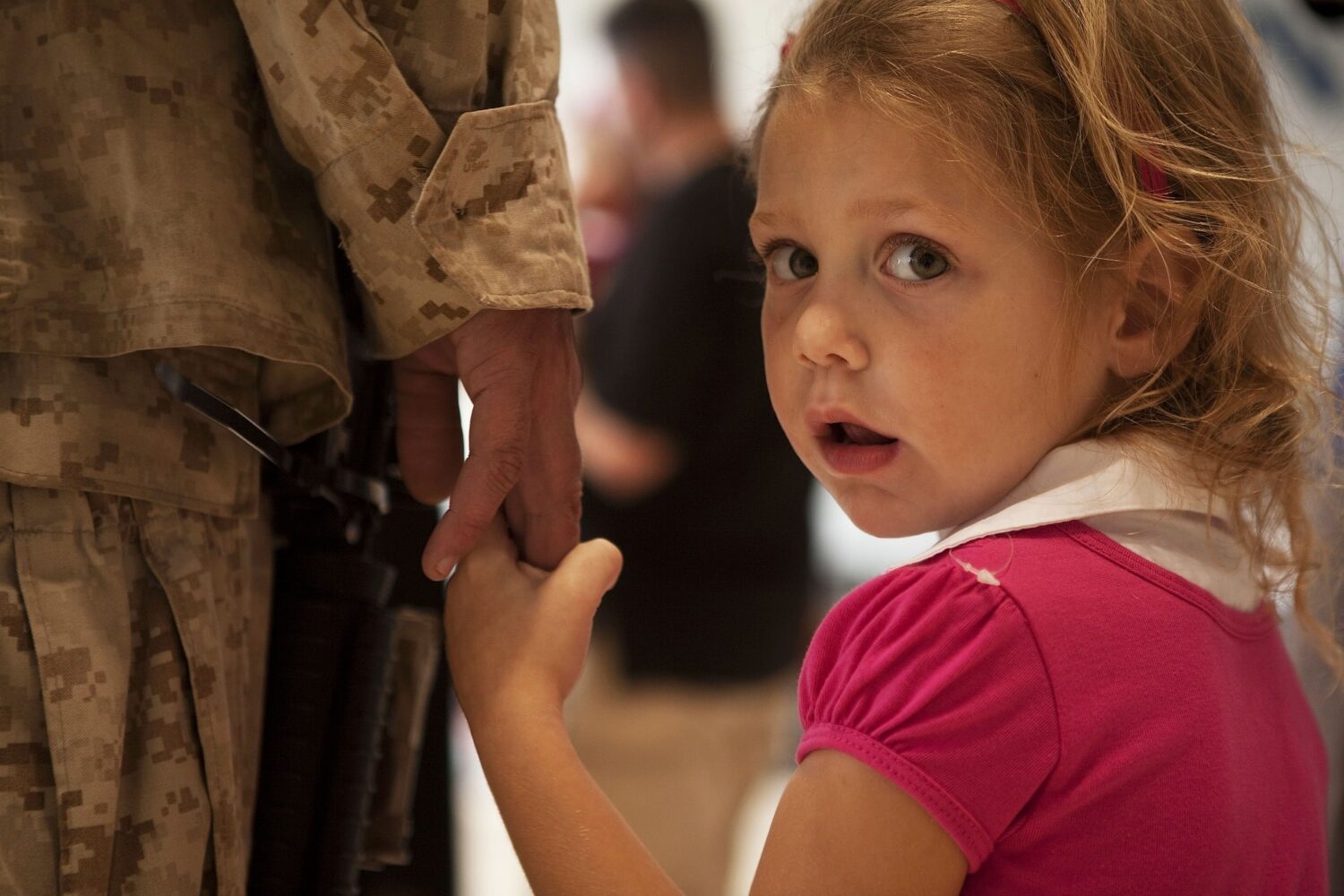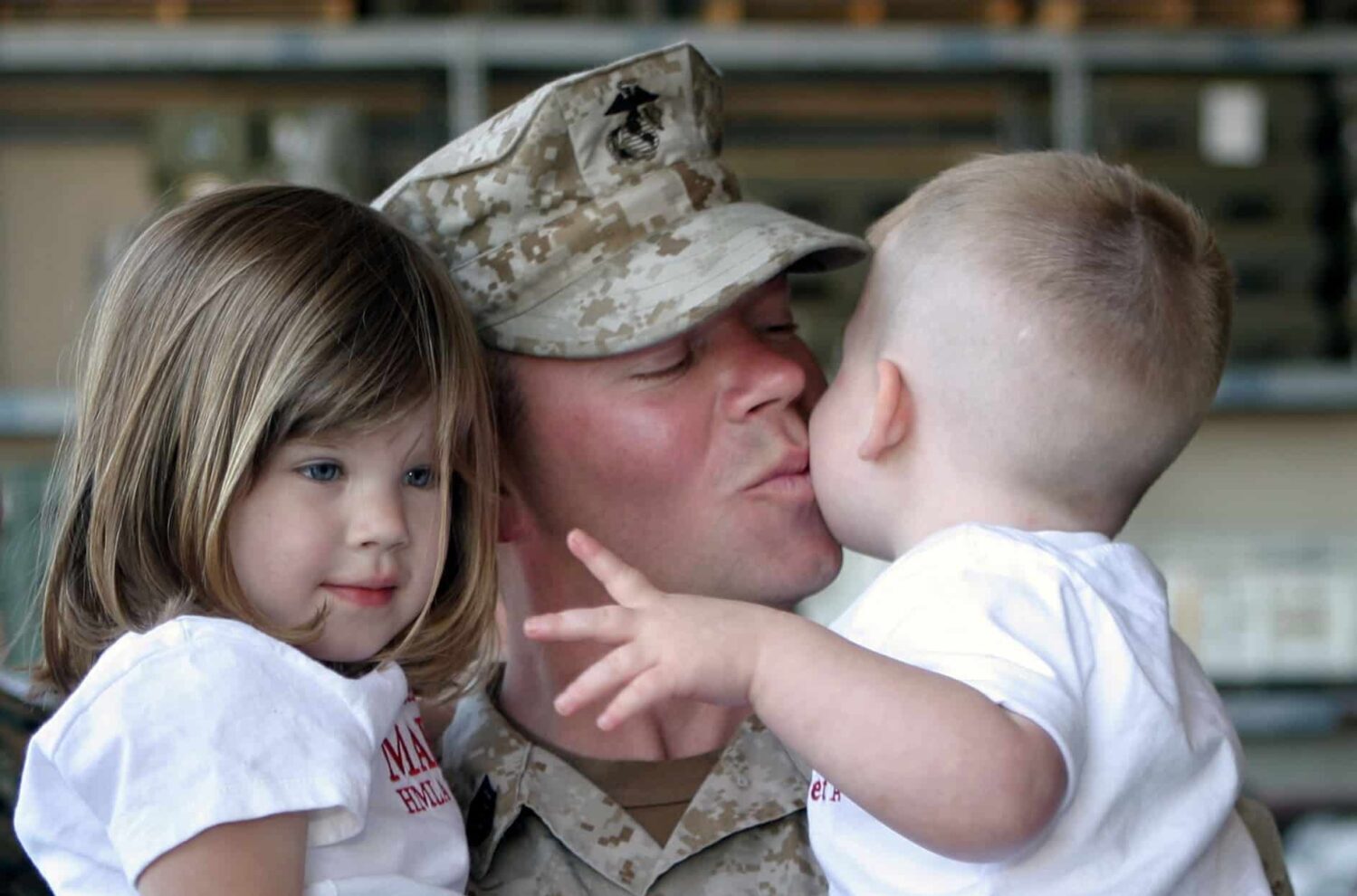[ad_1]
The formation of a safe attachment between a caregiver and a toddler supplies the inspiration for resiliency and wholesome coping methods throughout irritating instances. Disruptions to those early attachment relationships go away a toddler susceptible.
A constant theme in household adaptation is the household’s skill to make sense of their expertise. When a caregiver is away at struggle, the stress on the household is quick and may have lasting results, particularly on very younger youngsters.
Household Stress
Households of service members deployed to struggle are compelled to dwell with each the hope and expectation of a protected return and the acute consciousness of attainable lack of life. Throughout instances of struggle, danger varies for various relations and completely different household techniques.
“When a caregiver is away at struggle, the stress on the household is quick and may have lasting results, particularly on very younger youngsters.”
Disturbing life occasions and normative life occasions earlier than notification of deployment, throughout separation, and after reunion contribute to the general adaptation of the household. People who’ve robust connections to household and neighborhood assist and may determine and use these helps adapt to the adjustments and proceed to thrive after deployment. For others, the cumulative and continual nature of stressors on their household system will increase uncertainty about particular person and household well-being.
Infants and toddlers additionally expertise separation and loss, however their wants could be ignored when caring adults are overwhelmed and assume that youngsters won’t keep in mind this time. But the younger are essentially the most susceptible. Separation throughout deployment impacts an toddler’s attachment relationship with the service member. Boundary ambiguity about who’s in or out of the household, in addition to each seen and invisible wounds of struggle, signify different losses within the parent-child relationship.
Accidents sustained in struggle could also be seen or invisible to youngsters. Invisible accidents are harder for kids to grasp as a result of there are not any apparent bodily indicators. Invisible accidents resembling post-traumatic stress syndrome (PTSD), traumatic mind harm, and despair can hurt the standard of the parent-child relationship as a result of these wounds usually are related to parental irritability, speedy temper swings, emotional numbing, reminiscence loss, and lack of habits management. Any of those can improve youngsters’s danger for disorganized attachment, psychological misery, emotion and habits dysregulation, and poor well being and well-being.
Youngsters rising up in houses with a depressed dad or mum are at elevated danger for despair themselves, as are youngsters raised by dad and mom with substance abuse issues, particularly once they happen with excessive ranges of aggression and violence. Youngsters traumatized by parental violence might themselves develop signs of PTSD.

Photograph: PxHere.
The character of the invisible harm might instantly hurt household functioning and the standard of parent-child relationships needed for selling optimum youngster growth. Whereas all varieties of parental fight accidents affect numerous elements of household functioning, proof means that households are extra resilient when there are seen wounds and battle extra with adjustments associated to invisible ones.
Ambiguous Loss
The realities of stress on non-deployed dad and mom could make it tough for them to be emotionally current with their youngster throughout and after deployment. Uncertainty concerning the extent of the loss and the lack to deliver closure to those losses make them ambiguous.
Psychologists describe two varieties of ambiguous loss: when a liked one is bodily absent however psychologically current, and when a liked one is bodily current however psychologically absent.
The idea of ambiguous loss grew to become vital when analysis with households of U.S. army despatched to struggle within the Vietnam Struggle seemed on the psychological presence of a father declared lacking in motion.
Research confirmed that the impact of the daddy’s absence was influenced by the mom’s adjustment within the first few years after receiving notification of the daddy’s missing-in-action standing. Later research revealed that ambiguous loss throughout a dad or mum’s deployment modified not solely youngsters’s relationship with the deployed dad or mum but additionally their relationship with the non-deployed dad or mum.
Throughout Deployment
Definitely, each deployed dad and mom and kids at residence expertise the lack of shared developmental milestones (e.g., first smile, step, phrase). Prolonged separations are thought to have higher implications for younger youngsters, who’re developmentally unable to course of the reason for the separation, time of the dad or mum’s absence, or explanations of the dad or mum’s return.
When the service member is absent, the non-deployed caregiver and that caregiver’s attunement to the developmental milestones of the kid or the impression of stressors on the younger youngster are essential for regular attachment and growth of younger youngsters.
“Infants and toddlers additionally expertise separation and loss, however their wants could be ignored when caring adults are overwhelmed.”
Ongoing concern for the liked one’s security and a fixation on the struggle may end up in the non-deployed dad or mum or caregiver being psychologically absent in the course of the deployment. Whereas they’re bodily current, they might be unable to take care of regular routines or care for kids. For these adults, emotions of despair can result in ambivalence, guilt, nervousness, despair, and incapacitation.
Boundary ambiguity about who’s in or out of the household unit or what roles people play in a household could be conceptualized on a continuum with various levels of psychological presence or absence, in addition to altering bodily presence or absence. When a dad or mum is deployed or absent from the house for an prolonged interval, different relations assume their roles inside the household and will not be fascinated with relinquishing a few of these duties when the service member returns.
Reunion
Neighborhood helps in place throughout deployment may assume that when the service member is residence, life will shortly return to regular. Nevertheless, when service members return, they should cope with not solely their wartime experiences but additionally the lack of household as they knew it previous to their deployment. Many turn out to be conscious about developmental milestones missed and the power of the household to go on with out them. Because the boundaries of who’s in or out of the household change and the longer term appears unsure, households might expertise turmoil. Constructing an attachment relationship is influenced by dad and mom’ skill to be each bodily and psychologically current for his or her youngster throughout all phases of the deployment cycle, together with the reunion and reintegration of household.

Photograph: PxHere.
Army households and neighborhood assist want to grasp and normalize bodily responses to continual stress and the way these responses create ambiguity. The stress response that activated to assist the service member or at-home caregiver survive their irritating expertise takes a toll on the human physique. Over time, the endemic stress impacts bodily features like coronary heart price, blood strain, immunity, sleep, consideration, and moods.
Moreover, enthusiastic about detrimental occasions that occurred prior to now or fearing for the longer term can proceed to hijack the stress response, making it harder to handle on a regular basis relationships. When dad and mom are consumed with ideas and fears, they’re unable to be current and attuned to their youngster within the second, that’s, they may be bodily current however psychologically absent. This may occur at any stage of the deployment cycle.
Household Functioning
When dad and mom expertise stress that takes them away from being attuned to and current with their youngsters, there may be power is in search of assist from professionals. Significant remedy centered on the harm, function adjustments, and lack of private and household desires is central within the strategy of therapeutic.
A multi-level, systemic, resilience-building strategy is required to strengthen household and neighborhood sources, moderately than focusing solely on particular person deficits. Contemplating dad and mom’ fight accidents, interventions ought to respect particular person, household, army, and neighborhood variations. Having robust social assist facilitates higher adjustment for the injured and has a buffering impact on the household. When social helps cut back the stress skilled by the army household, the dad or mum can give attention to being emotionally responsive and attuned to the wants of their youngster.
“When service members return, they should cope with not solely their wartime experiences but additionally the lack of household as they knew it previous to their deployment.”
The youth trajectory is formed largely by infants’ relational world of household, neighborhood, and life contexts. Throughout instances of stress, dad and mom can present consolation and safety for his or her youngsters by establishing and sustaining routines. Age-appropriate duties might assist youngsters really feel that they’re contributing positively to the household.
Youngsters must make sense of what the stress means for his or her life. When adults talk age-appropriate info, it helps youngsters’s intuitive sense that one thing is unsuitable. Dad and mom can even create an atmosphere the place the kid is aware of it’s acceptable to ask questions. What youngsters need and must know adjustments as they develop. Youngsters categorical a broad vary of feelings, and so they usually want their caregivers to assist them title and regulate their feelings.
Little one growth research constantly promote the advantages of youngsters sustaining a relationship with each dad and mom. Youngsters want the adults of their life to plan actions and rituals that assist them really feel linked to a dad or mum who’s bodily absent.
Throughout wartime deployments, occasions inevitably happen outdoors households’ management. Relations’ beliefs, values, targets, and perceptions of themselves within the context of their neighborhood might affect whether or not the household views their scenario as manageable. Neighborhood helps can give attention to lowering parental stress, mitigating psychological well being challenges, constructing confidence in dad and mom’ engagement, and supporting methods that allow dad and mom to dwell in methods which can be in keeping with their values.
[ad_2]
Source_link





